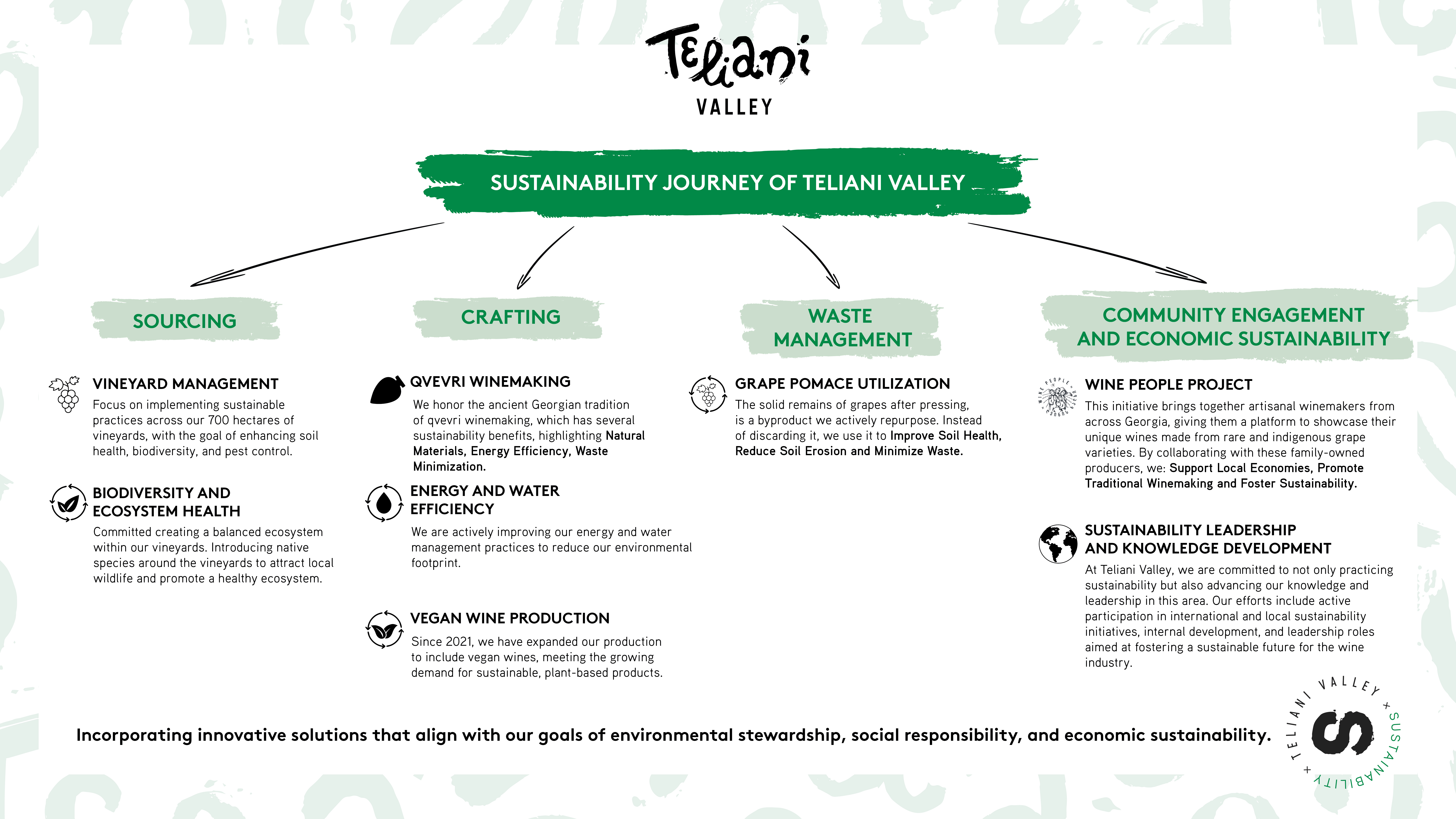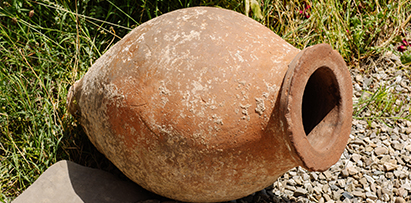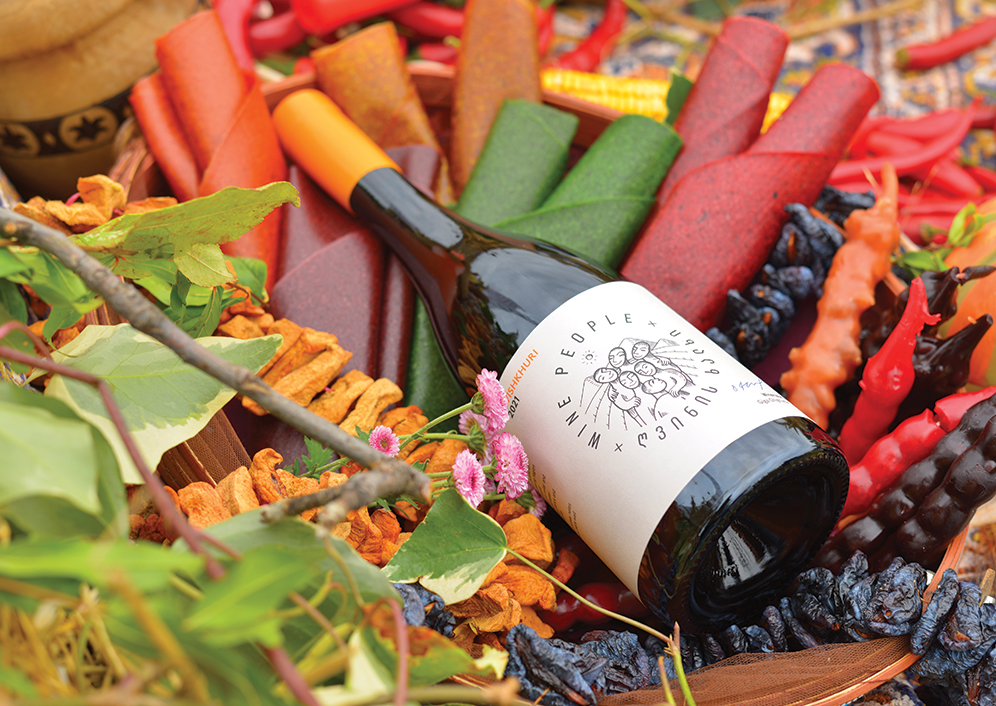
Sustainability journey of
Teliani Valley
Since our founding in 1997, Teliani Valley has been committed to producing high-quality Georgian wines. As we continue to grow, we recognize the increasing importance of sustainable practices and their long-term impact on the environment, society, and the economy. While we are early in our sustainability journey, we are dedicated to incorporating more environmentally friendly, socially responsible, and economically viable methods in all aspects of our operations. This charter outlines our current efforts and future goals in sustainability.

We focus on implementing sustainable practices across our 700 hectares of vineyards, with the goal of enhancing soil health, biodiversity, and pest control. Our initiatives include:

Cover Crop Management: We plant a variety of cover crops, such as clover, vetch, rye, and barley, which help improve soil structure, increase organic matter, and attract beneficial insects. These cover crops also help with nitrogen fixation and prevent soil erosion, contributing to a healthier and more resilient vineyard ecosystem.
Efficient Irrigation: Water is a precious resource, and we strive to use it responsibly. We employ drip irrigation, which delivers water directly to the root zone, reducing evaporation and runoff. We also monitor soil moisture regularly to optimize water use. In addition, we utilize drainage systems to prevent waterlogging and soil degradation.
Efficient Irrigation: We use adaptive fertilizer practices to minimize environmental impact. By conducting regular soil and leaf tissue analyses, we tailor our fertilization strategies to meet the needs of the vines while reducing excess nutrient application. Slow-release fertilizers are applied at key growth stages to reduce leaching and ensure the vines receive the nutrients they need.
We are committed to creating a balanced ecosystem within our vineyards.
To achieve this:

At Teliani Valley, we honor the ancient Georgian tradition of qvevri winemaking. This method involves fermenting and aging wines in large clay vessels, which are buried underground. Our commitment to this traditional practice has several sustainability benefits:
Natural Materials: Qvevris are made from locally sourced clay, a renewable and sustainable resource. Unlike modern winemaking materials, qvevris have a minimal carbon footprint.
Energy Efficiency: By burying the qvevris, we take advantage of the earth's natural insulation, which regulates temperature and reduces the need for energy-intensive cooling or heating systems. This significantly lowers our energy consumption.
Waste Minimization: Qvevri winemaking uses nearly all parts of the grape, including skins, seeds, and stems, which reduces waste. Any remaining grape pomace is often repurposed to make chacha, a traditional Georgian spirit, further minimizing our environmental impact.

We are actively improving our energy and water management practices to reduce our environmental footprint:

Energy Efficiency: Since 2019, we have been using LED lighting throughout our facilities. Our long-term goal is to transition to 100% solar power by 2030, which will drastically reduce our reliance on non-renewable energy sources.
Water Management: Water conservation is a priority. Our drip irrigation system minimizes water waste, and we have implemented rainwater collection systems for non-potable uses, such as watering landscaping around the winery. Additionally, we recycle greywater (from cleaning equipment, floors, and tanks) by filtering and treating it before reusing it in vineyard irrigation. These efforts significantly reduce our overall water usage.
Since 2021, we have expanded our production to include vegan wines, meeting the growing demand for sustainable, plant-based products. These wines are produced without the use of animal-derived fining agents, such as gelatin or egg whites, which are traditionally used in winemaking.
Grape pomace, the solid remains of grapes after pressing, is a byproduct we actively repurpose. Instead of discarding it, we use it to:
Improve Soil Health: Grape pomace is rich in nutrients like nitrogen and potassium, which enhances soil fertility. It also helps improve soil structure, aeration, and water retention, promoting healthier vineyards.
Reduce Soil Erosion: When applied to the vineyard earth surface, pomace helps retain soil moisture and prevents erosion, particularly in dry conditions.
Minimize Waste: By utilizing grape pomace in our vineyards and to produce chacha, we significantly reduce the waste generated by the winemaking process.
Teliani Valley is committed to supporting local communities and small-scale winemakers through our “Wine People” project. This initiative brings together artisanal winemakers from across Georgia, giving them a platform to showcase their unique wines made from rare and indigenous grape varieties. By collaborating with these family-owned producers, we:
Support Local Economies: The project provides economic opportunities for small winemakers, helping them reach wider markets and sustain their businesses.
Promote Traditional Winemaking: We work with winemakers who use traditional methods, preserving the heritage of Georgian winemaking while bringing it to global audiences.
Foster Sustainability: By focusing on small-scale, local production, we help reduce transportation emissions and promote rural economic resilience, which supports sustainable development.


Teliani Valley is at the beginning of a long-term commitment to sustainability. While we have already implemented several key practices, including efficient vineyard management, low-impact winemaking, waste reduction, and community engagement, we are dedicated to continuously improving and expanding these efforts. By integrating modern technology with ancient winemaking traditions, we aim to create wines that are not only exceptional but also contribute to a sustainable future for the wine industry in Georgia and beyond. We are proud to be on this journey and will continue to seek innovative solutions that align with our goals of environmental stewardship, social responsibility, and economic sustainability.